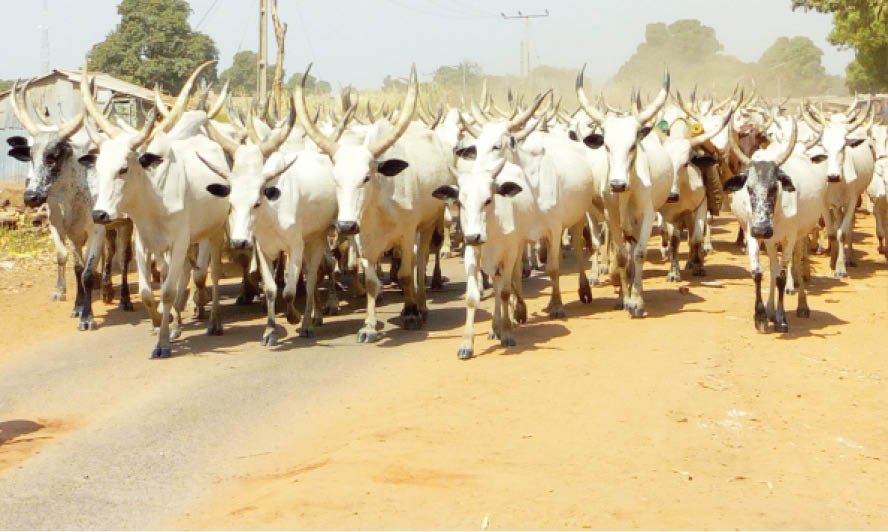Nigerian government cannot continue to ignore farmers-herders crisis
The farmers-herders crisis in Nigeria has stretched on for years and has consumed lives and property. In response to this, the Ondo State governor issued an ultimatum to Fulani herdsmen to vacate Ondo’s forests. In another separate but related event in Oyo, Sunday Igboho, a non-state actor, ordered herdsmen to vacate Ibarapa, one of the […]

FILE PHOTO: Cows
The farmers-herders crisis in Nigeria has stretched on for years and has consumed lives and property. In response to this, the Ondo State governor issued an ultimatum to Fulani herdsmen to vacate Ondo’s forests. In another separate but related event in Oyo, Sunday Igboho, a non-state actor, ordered herdsmen to vacate Ibarapa, one of the hotspots of the farmers-herdsmen crisis. These are pointers that the crisis is reaching a tipping point and if nothing drastic is done urgently to put an end to the issue, it might turn a catastrophic corner.
In the past 10 years, the Nigerian government has spent about six trillion naira on security. Yet, in spite of this huge spending, the country is still fraught with several security challenges. According to the latest Global Terrorism Index, Nigeria ranks third among the top 10 countries impacted by terrorism.
- No ethnic group should lord it over others — Gbajabiamila
- Attacks on Fulani: Act now before we lose Nigeria, Tofa tells Buhari
Between January 2016 and October 2018, Amnesty International recorded that about 3,641 people were killed in attacks and reprisal attacks between farmers and cattle herders in the northern and middle belt regions of the country. These attacks have not ceased, rather they have now expanded to other parts of the country.
The conflict which is a result of the competition over declining natural resources, among other environmental factors, may grow worse. According to the Ecological Threat Register 2020 lack of resilience to threats such as drought, population growth, floods, water stress, rising temperatures among others “will lead to worsening food insecurity and competition over resources, increasing civil unrest and mass displacement.”
It is time the Nigerian government acted and performed its constitutional duty, which is to safeguard lives and property. It must, as a matter of urgency, begin conflict mediation and resolution between the respective parties. As well, the government should investigate the different crimes perpetrated allegedly by these Fulani herdsmen and punish those found culpable. Without these, it would be hard to build the trust of the indigenes of the affected host communities and conflict will continue to occur.
Importantly, grazing should also be regulated. Herdsmen should get permits from respective state governments and local community heads before they are allotted grazing areas. This will curb incessant encroachment of farmlands by unchecked herdsmen.
Indeed, as the International Crisis Group noted, the herdsmen conflict sharpens ethnic, regional and religious polarisation and could undermine national stability. Without urgent actions, this civil unrest will continue and may inevitably threaten the peace that is already elusive in the country.
Daniel Whyte is a writing fellow at African Liberty
